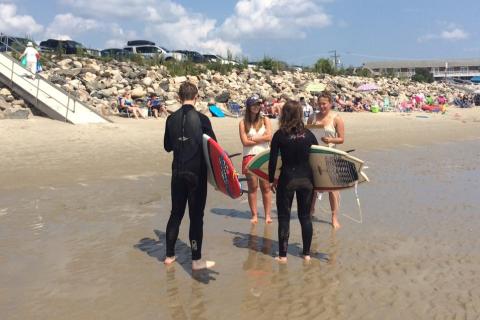
EPSCoR Role: Master's student, Plymouth State University Center for the Environment
Current Position: Source Water Protection Coordinator, Maine Center for Disease Control and Prevention Drinking Water Program
For Sophie Scott, making sustainability science part of going to the beach was a no-brainer.
When Sophie joined the NH EPSCoR Safe Beaches and Shellfish project as a Master’s student at Plymouth State University in 2014, she was dreaming up an aquaculture collective with her cousins and looking for the right opportunity to go back to school.
“When my friend sent me the description of the position, I felt like it was written for me,” Sophie says. “A connection to the coast is so ingrained in me – it always makes me feel like home.”
The project was the first major undertaking of the newly-formed New England Sustainability Consortium, or NEST, a collaboration that pulls together scientists from many different disciplines throughout New England to solve sustainability challenges.
“As the only graduate student from Plymouth State on the project, it would have been easy for me to feel isolated in the larger NEST group,” Sophie says. “But that was not the case. In particular, the class I took exploring sustainability science with other NEST researchers made me feel like an active participant in the larger group.”
In keeping with NEST’s larger focus on bridging the gap between science and environmental policy, the Safe Beaches project addressed water quality issues surrounding shellfish beds and recreational beaches in the Gulf of Maine.
For Sophie, the project’s research focus felt close to home. “When I found out there was a need for folks on the beach side of things, I was happy to oblige because I spent most of my childhood exploring the beaches of Maine,” she says. “I come from a family of fishermen in Penobscot Bay, so I was excited to be part of a project that was not only so in line with my academic interests, but also felt close to my heart.”

Sophie’s work ended up focusing on an underrepresented population of beachgoers who are more susceptible to poor water quality than average – surfers (yes, there are surfers even in the cold waters of the Gulf of Maine!). Her research was the first of its kind to look specifically at this unique group through the lens of water quality.
To better understand what surfers know about water quality and its risks, Sophie and her team surveyed almost 300 surfers at 12 beaches on the New Hampshire and southern Maine coast. They also conducted 20 in-depth interviews with other important members of the surfing community.
The major theme that emerged from her analysis was that surfers hold a wealth of ‘local ecological knowledge’, or LEK, where their sport is concerned. While LEK may not be something that can be collected in a sample bottle and analyzed in a lab, it can fill in data gaps and become a valuable resource to coastal managers.
Sophie presented her work at numerous conferences and produced two scientific papers – one currently in press at the Journal of Ocean and Coastal Management. She and her team even hand-delivered a one-page fact sheet to surf shops up and down the coast and presented their work to a group of more than 80 surfers at a local event. “For me, the most meaningful part of communicating our research was when we brought our findings back to the stakeholders who made it possible,” she says.

Sophie’s advisor, Dr. Shannon Rogers, formerly an assistant professor of ecological economics at PSU and now a nature-based economic development specialist at UNH Cooperative Extension, played a huge role in shaping Sophie’s research focus and her future. “Dr. Rogers is a truly brilliant scientist, a champion for women in STEM, and a mentor who helped me find my true passion for the linkages between humans and the environment,” she says. Before she joined the NEST project, Sophie focused mainly on physical and biological sciences, but that changed over the course of her program. “It turns out I’m a social scientist at heart – and proud of it!”
After earning her Master’s, Sophie was hired on as a summer communications associate at the Southern Maine Conservation Collaborative in Portland, Maine, where she helped with education and outreach initiatives, and then continued on as an environmental consultant. While she looked for a more permanent position, Dr. Rogers continued to provide support by keeping her on as a NEST research assistant, which allowed her to create more valuable materials to share with stakeholders. Through other NEST connections, she was also able to help manage a beach profile survey conducted by the University of Maine and the Maine Coastal Program.
Sophie now has a position as the Source Water Protection Coordinator at the Maine Center for Disease Control and Prevention Drinking Water Program. “Diving into the drinking water world had a bit of a learning curve,” she says, “but I get to pursue my passion of exploring social-ecological systems and work on my science communication skills through the outreach and education portion of the job.”
Sophie says that connections she made while part of the NEST project have been invaluable in the pursuit of her goals. “NH EPSCoR truly helped me to identify my interests and discover my passions. The NEST project in particular really shaped who I am as a scientist and what I want to pursue.”
-- Rita Belair
